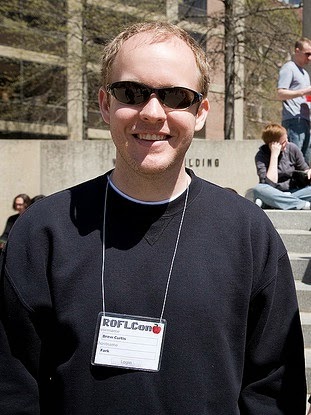 |
| Drew Curtis - photo by Scott Beale / Laughing Squid |
While the majority of people reporting on the news have been incredibly supportive of the announcement, like Nina Bahadur of The Huffington Post and s.e. smith of xojane, there are those, such as Amanda Hess of Slate, who combine their support with a certain amount of skepticism, wondering whether policing misogyny, especially on a site like Fark, is even possible. As Hess points out in her piece,
"telling members of an anonymous Internet message board to stop hating women is, unfortunately, a monumental ask. But instructing posters to refrain from pushing the boundaries of acceptable human discourse...is an irresistible provocation. The gray area between vile offensiveness and dark humor is where Fark's commenter community thrives."The community, it seems, is partially built upon a foundation of oftentimes offensive one-upmanship that has made the site feel unwelcome to some women. But in many ways, being female and safely moving around the Internet can resemble a particularly difficult level of Frogger. As Caitlin Dewey of The Washington Post points out, much of what makes this announcement so noteable "relates to a core ethos of Internet communities: the idea that moderation, particularly on divisive issues, is akin to censorship -- and that censorship is the bane of the transparent, social Web." The policy, she continues, is less a minor change in the rules of one relatively small website, and more a statement on Internet culture writ large.
The really interesting question here is less whether Fark can enforce these new guidelines and more whether it should. In 2011, Anil Dash wrote a post that makes the argument that, contrary to the seemingly ubiquitous statement on websites that "we are not responsible for the content of our comments," webmasters are in fact under a moral obligation to control the tenor of conversation on their sites. While it is true that the online world can be a hateful and horrible place, it does not have to be the web-based version of the Wild West. Ignoring persistently cruel behavior because, well, it's the Internet, is, in many ways, counter-productive. By turning a blind eye to abuse, many webmasters are creating a safe environment for cruelty while at the same time one where those seeking support, amusement, or an exchange of ideas feel stifled and threatened. Free speech for the mean-spirited does not necessarily translate into free speech for everyone. Take, for example, Zelda Williams' recent departure from Twitter as a result of the harassment she endured following the tragic death of her father. The comments and images she received were so cruel, that her use of a popular social networking site was made completely unbearable. Her freedoms of speech and of expression were hindered and nothing was done about it. She is by no means alone in her experience. In 2013, a well-known Canadian feminist blogger went into hiding after being doxxed and then sent dozens of death threats by the men's rights group Equality Canada. This is the extreme result of what an entirely open Internet culture can foster and shows that what happens on the Internet does not always stay on the Internet.
It will be interesting to see in the coming months what kind of effect, if any, these new commenting policies have on the bro-culture over at Fark. Given the comment thread that resulted from Amanda Hess' article, it seems as though Fark mods will be fighting an uphill battle, but a worthwhile one. And perhaps down the line, other sites like Reddit and Gawker, as well as social media platforms such as Twitter and Facebook, will follow suit and curb the online abuse that so many people face. Because, honestly, while of course we have the right to say hateful things to strangers for no good reason other than our own amusement, why should that environment be fostered and protected while those who feel a moral obligation to kindness and respect are sent running offline?
Fark Bans Misogyny From its Forums, Proves It's Possible [Huffington Post]
Fark Bans Misogyny in Comments, Setting a New Precedent for Bro-Culture Websites [xojane]
Fark Wants to Ban Misogyny. Is That Even Possible? [Slate]
This is What Happens When You Try to 'Ban Misogyny' from a Major Website [The Washington Post]
